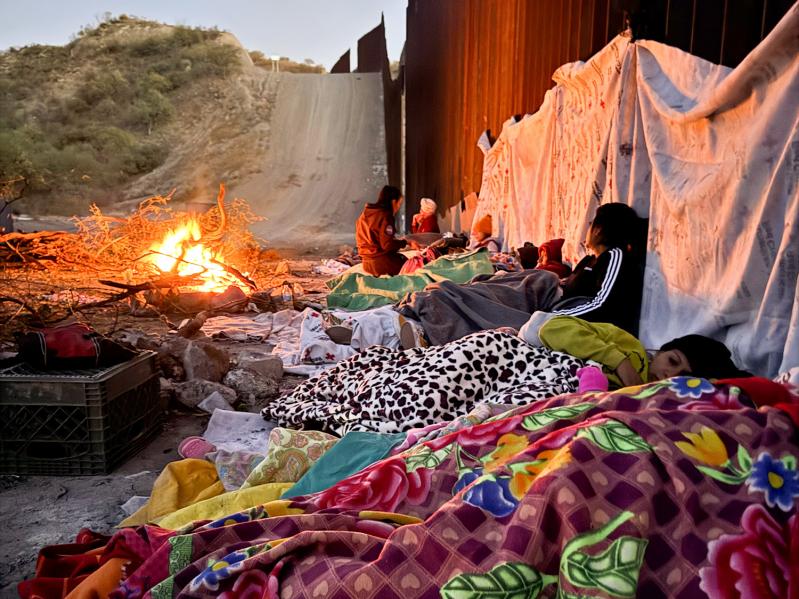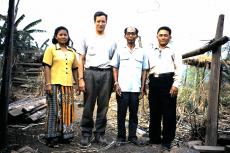Near Sasabe, Ariz., there’s a gap in the 30-foot-tall border wall that separates the United States from Mexico. Hundreds of refugees have been pouring into the U.S. daily through this opening, waiting — and hoping — to be picked up by Border Patrol agents so they can begin the process of seeking asylum, having fled extreme violence, corruption, and crime in their home countries.
But the Tucson Sentinel reported on Christmas Eve that Border Patrol was nowhere in sight as freezing rain pummeled that region, threatening the travel-worn migrants with hypothermia until humanitarian groups could arrive to provide aid in the form of blankets, water, food, and, when needed, emergency medical assistance.
It was there, earlier this month, that Elissa McLean and Andy Winter found themselves wrapped up in those humanitarian efforts. A pair of empty nesters, late of Noyac, who have been living the “van lifestyle” since their daughter graduated from the Ross School in June, Ms. McLean and Mr. Winter spent two weeks assisting at the border however they could.
“Border Patrol is totally overwhelmed. It’s unprecedented right now,” Ms. McLean said.
“I feel like our biggest task was greeting them in a really kind and respectful and loving way,” Mr. Winter said. “These are people who have been fleeing for their lives and find themselves in the middle of nowhere and they are still really scared.”

Speaking the language of the refugees was critical in their ability to help, they said. Ms. McLean, a former Ross School teacher who also runs Express Fluency, a rapid language acquisition program, is fluent in Spanish, and even found herself speaking French to a Senegalese person who had just crossed into the U.S. via Mexico.
They often found themselves as a sort of “middle man,” assessing what the refugees needed and communicating with other humanitarian groups working in the region, who could in turn contact Border Patrol directly in the most dire of circumstances. “Once these humanitarian groups locally saw us and met us and we worked together, then they gave us access to some of their stuff, like a large cache of water bottles, which made it easier,” Mr. Winter said.
Ms. McLean and Mr. Winter put water bottles into the hands of the thirsty. They cooked beans and tortillas on a camping stove to feed hundreds, many of whom hadn’t eaten in days. They bought and handed out blankets to provide warmth at night. They used their own satellite Wi-Fi hotspot and cellphone chargers to allow people to call their loved ones.
“They hadn’t been able to contact their families for days or weeks. . . . It was really profound to be able to help that happen for people,” Ms. McLean said. “You could eavesdrop on tearful conversations saying, ‘We made it, we’re here.’ You could hear abuela [grandmother] crying on the other end.”
Mr. Winter said that men often approached him to ask if he knew of work opportunities.
“We thought we were fairly well educated about what’s happening at the U.S.-Mexico border, but we were educated in an intense way there ourselves,” Mr. Winter said. “If people knew, they would help more, and help personally.”
The Tucson Sentinel reported that Border Patrol has about 19,400 officers working along the U.S.-Mexico border, who in November collectively took 191,113 people into custody. Of those, 32,267 people arrived as families, and nearly 4,000 were children without parents.
Ms. McLean lamented the antimigrant rhetoric often heard during President Donald Trump’s time in office, much of which persists in public discourse today. “Think about the kind of things that he says about immigrants — things like ‘They’re letting out the jails and insane asylums’ and ‘They’re rapists’ — a huge amount of people in this country believes that. And then you see these people, the families coming over — they’re the nicest people ever. This is the invasion? This is the criminal?”
“If you believe half or a quarter of what’s being said in the media, you would fear these people, but if you stopped and talked to them and really looked at them, there’s no way you could,” Mr. Winter said. “They are families. They are kind human beings who are just trying to stay alive. . . . We should be paying a little more attention to that than to believing the problem is them.”

They returned to the South Fork to spend time with family members for Christmas, but are planning to return to Sasabe soon, even though it was a difficult and exhausting experience. Ms. McLean and Mr. Winter will give a presentation at LTV Studios in January on their experiences and ways that everyday people can help, and Ms. McLean is planning to launch a Spanish-language program specifically for aid workers.
“One of the really striking things about this experience is that these people inspired me,” Mr. Winter said. “What I was doing was simple. I had a nice vehicle that can drive anywhere, I have what I need, I’m taking very limited risk in being out there helping, and these people are risking everything. . . . I was floored by how kind and respectful and caring and grateful they were.”
“I feel like we were working on adrenaline,” Ms. McLean said. “In the moment, we were energized because it felt so important and helpful . . . but every now and then you’d see something and you’d cry. It was heartbreaking, and heart-expanding.”




